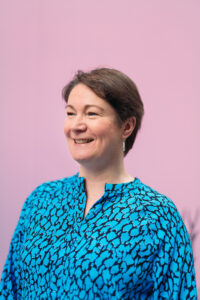Resources · Posted May 19, 2025
Inclusivity and Consultancy
Our Business Development Manager, Sam Ross, recently bumped into Aileen Carson and had a great chat about inclusion and accessibility…
Aileen Carson is a career coach and expert in supporting neurodiversity in the workplace. She is also a valued coworking member, frequently attends our events, and is one of our trusted professionals available through our Consultancy service.

Aileen has a wonderful habit of getting herself into the right wellbeing and neuroinclusive spaces across Edinburgh. So, was it really a surprise when we bumped into each other at The Mindful Enterprise’s 8th birthday? No, but it was a reminder that we needed to document some of our excellent chats about inclusion and high performing teams.
Deep down, we all know that inclusion and accessibility is useful for business success. But I wanted to know, is it essential?
Why is building inclusive, accessible and diverse teams essential for business success?
Aileen: “When you bring together people with different backgrounds, experiences and ways of thinking, you get fresh ideas, creative problem-solving and perspectives that a homogeneous team can’t provide. The more viewpoints in the room, the better the solutions, and that’s a huge advantage for any organisation striving to make a real impact.
But it’s not just about innovation. Inclusion and accessibility also create stronger, more engaged teams. When staff and volunteers feel valued, heard and supported, they’re more likely to do their best work.
There are also the people served by organisations and businesses to think about. Having a team that reflects and understands those communities leads to more effective, empathetic and relevant services. When organisations prioritise inclusion, they build trust, develop meaningful connections and ensure their work reaches those who need it most.
Building an inclusive and accessible workplace isn’t just the right thing to do – it’s essential for making a lasting impact.”
Just because something is essential, doesn’t mean it’s easy. From the delivery of The Melting Pot’s pilot Consultancy projects, we know that one of the first hurdles to building inclusive teams is identifying a need to be more inclusive in the first place. How often do we look around the room and think, who isn’t here? Who haven’t we reached? Aileen has seen other challenges as a neurodiversity coach too.
What are the biggest challenges you have seen in creating diverse and inclusive workplaces?
- Limited knowledge and awareness – many organisations don’t recognise, or know how to remove, the systemic barriers that prevent people from working at their best. In addition, managers don’t receive adequate training, leaving them unprepared to discuss reasonable adjustments or support disabled team members.
- Recruitment and retention – attracting diverse talent requires inclusive recruitment practices. Traditional recruitment practices often exclude certain groups, such as neurodivergent people, so businesses need to explore new approaches.
- Lack of leadership commitment – diversity and inclusion initiatives can feel superficial if leaders don’t genuinely prioritise them. Leaders must set the tone by modelling inclusive behaviour and addressing any resistance to change which may arise from those who perceive diversity efforts as unnecessary.
- Lack of psychological safety – no one has to share a diagnosis or disability with their employer, but if people don’t feel it is safe to do so, they are far less likely to request adjustments or support if they need them. A key element of an inclusive workplace is creating psychological safety, ensuring every employee feels they belong.
Let’s say you get beyond these challenges – where do you start, to build a more inclusive team? Sometimes it’s as simple as looking at organisations that have openly shared their journey toward inclusivity, and at other times, it might be implementing new tools. For example, Welcome Brain’s latest neuroinclusive hiring practice certificate is a great example: for us at The Melting Pot, this certificate allows us to shout about the neuroinclusive practices we already did, but didn’t realise were worth shouting about.
If you’re interested in exploring your organisation’s inclusivity, as well as brainstorming ways to improve, The Melting Pot’s Consultancy is here to support your thinking and co-design a way forward. Our exploratory approach and trusted trader network mean that The Melting Pot and delivery partners like Aileen Carson can support you to create an inclusive place for your people.
